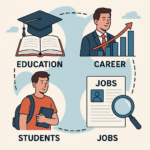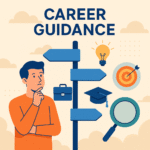Career guidance is one of the most important support systems a person can receive, especially during the early stages of academic or professional life. It’s not just about choosing a job — it’s about finding direction, building skills, and understanding where your strengths can meet market demand.
In today’s fast-moving world, having the right guidance can help individuals avoid career stagnation, switch fields wisely, and gain clarity in times of uncertainty. Whether you’re a student wondering what to do after school or someone seeking a meaningful shift in your profession, this article will help you take practical steps toward a fulfilling future.
What is Career Guidance?
Career guidance refers to structured advice and support provided to individuals regarding their education, job choices, professional development, and personal ambitions. It often includes counselling, assessments, workshops, mentorship, and exposure to various industries.
The aim is to help people make informed decisions by evaluating their interests, strengths, values, and long-term goals. Instead of trial and error, career guidance provides a clearer route to career satisfaction and success.
Key Takeaway:
Career guidance helps individuals align personal interests with professional goals, reducing confusion and wasted time in unsuitable roles.
Read more:- Banking Career Guide
Why is Career Guidance Important?
According to recent surveys, over 65% of professionals in their 30s express regret over their initial career choices. Most of these decisions were made under pressure, without proper advice.
Here’s why good guidance matters:
-
Prevents career mismatches
-
Reduces stress and confusion for students
-
Promotes career stability and progression
-
Helps in transitioning during a mid-career crisis
-
Builds confidence in decision-making
Career guidance is not limited to school or college students. Even working professionals can benefit from it when considering changes, promotions, or upskilling options.
Key Takeaway:
With correct advice at the right time, individuals can make career moves that match their potential and life situation.
When Should You Seek Career Guidance?
There is no fixed age or stage. People need career guidance at various points in life, including:
1. After 10th or 12th Grade
This is a major turning point. Choosing between science, commerce, and arts, or even vocational streams, can influence one’s future opportunities.
2. During or After Graduation
Students often find it difficult to relate academic degrees to specific jobs. Career guidance helps bridge that gap.
3. While Planning a Career Change
When someone is unhappy with their job or facing burnout, guidance offers alternative options and clarity.
4. During Industry Shifts
In rapidly changing industries like IT, finance, or healthcare, job roles evolve. Staying current requires understanding where the industry is heading.
5. Before Taking a Major Career Decision
This could include moving abroad, accepting a leadership role, or starting a business.
Key Takeaway:
Career guidance is helpful not only at the beginning but also throughout one’s working life, especially during major decisions or doubts.
How to Identify the Right Career Path
Career guidance starts with self-awareness. Here are the four main aspects you should evaluate:
1. Interests
What topics or activities naturally attract you? Your interests can give clues about suitable fields.
2. Skills
These include both soft skills (communication, leadership) and hard skills (coding, designing, data analysis).
3. Personality
Are you introverted or extroverted? Do you enjoy structure or flexibility? Your personality impacts how satisfied you’ll feel in certain roles.
4. Values
What matters to you — job security, high income, work-life balance, creativity, or social impact?
Professional career assessments or psychometric tests help gather insights about these areas.
Key Takeaway:
Knowing yourself is the first step. Career guidance helps you match your unique traits to the opportunities out there.
Read more:- PCM Career Options
Role of Career Counsellors and Mentors
Career counsellors and mentors play different but equally important roles in guiding individuals.
Career Counsellors
They are trained professionals who conduct tests, interpret results, and offer structured advice. Their support is data-driven and unbiased.
Mentors
These are experienced individuals in specific industries who share practical advice from their journey. They help with decision-making, goal setting, and networking.
Ideally, combining both gives you emotional support and factual insight — a balanced view of your career options.
Key Takeaway:
While mentors guide from experience, counsellors provide professional assessments. Both perspectives are valuable for career success.
Most Common Career Planning Mistakes
Knowing what not to do is just as important. Here are common pitfalls people face:
-
Following trends blindly
Choosing a field just because it’s popular can lead to dissatisfaction. -
Ignoring aptitude and personality
A mismatch between your nature and your job often results in long-term frustration. -
Being influenced by family pressure
While parents have good intentions, their preferences may not always align with your interests. -
Not adapting to change
Clinging to outdated skills or resisting new opportunities can hinder growth. -
Assuming one job for life
Modern careers involve flexibility and frequent shifts; your career path doesn’t have to be linear.
Key Takeaway:
Avoiding early mistakes can save years of confusion and put you on the right track from the start.
Read more:- aerospace engineering salary in India
Steps to Build a Successful Career Plan
Here is a step-by-step framework anyone can follow to map out their career:
Step 1: Self-Assessment
Identify your strengths, interests, and goals using trusted tools or a counsellor’s help.
Step 2: Research
Look into job roles, salaries, required qualifications, and future scope. Speak to professionals in those fields.
Step 3: Skill Building
Pursue courses, internships, or certifications that make you job-ready and keep you relevant.
Step 4: Create a Short-Term and Long-Term Plan
Decide where you want to be in 1 year, 3 years, and 5 years. Break it into manageable goals.
Step 5: Keep Reviewing
The job market changes, and so do you. Regularly evaluate and update your plan.
Key Takeaway:
A clear, flexible, and goal-oriented plan helps you navigate the job market with confidence.
Popular Career Options in 2025
As per current market data, the following fields are seeing a rise in demand:
-
Artificial Intelligence & Machine Learning
-
Cybersecurity
-
Digital Marketing & SEO
-
Healthcare (Nursing, Physiotherapy, Health Tech)
-
Finance & Data Analytics
-
Renewable Energy & Sustainability Roles
-
UI/UX Design & Product Management
-
Trades (Electrician, Plumber, Technicians – high demand with skilled pay)
-
Teaching & EdTech Roles
-
Legal and Compliance Careers
These options span across creative, technical, managerial, and vocational lines, offering something for every personality type.
Key Takeaway:
New-age careers are driven by technology, sustainability, and service. Choose based on long-term value, not short-term hype.
Online Platforms That Help with Career Guidance
If you can’t access in-person support, there are several digital tools and websites that provide career support:
-
LinkedIn Learning – Industry-specific courses and career learning paths
-
Coursera / edX / Udemy – Skill-building across all domains
-
Mindler / CareerGuide / iDreamCareer – Online counselling platforms for Indian students
-
Indeed / Glassdoor – Job insights, salary trends, company reviews
-
MyNextMove.org (USA) – Interest-based career suggestions from the US Department of Labor
These platforms offer free and paid options to support every stage of your journey.
Key Takeaway:
Digital tools make career planning accessible for everyone, regardless of location or background.
Final Thoughts
Career guidance is more than a one-time conversation. It’s a continuous process of learning, reassessing, and growing. Whether you’re a student, a working professional, or someone planning to restart your career, the right guidance can prevent costly errors and give you direction when you need it most.
Rather than rushing into decisions or following the crowd, take a moment to evaluate what truly fits your profile. Seek professional advice, learn from mentors, and use available resources to shape a career path that’s meaningful and future-proof.






